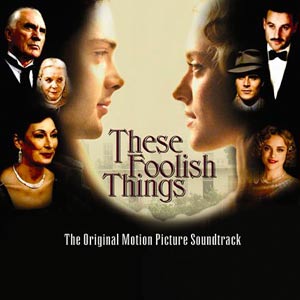These Foolish Things
Music composed by Ian Lynn
Source music by Gerald Finzi and others
Available on Sony/BMG (8287680387)
Running Time: 57:00
Amazon UK

See also:
Gerald Finzi: Cello Concerto Gerard Finzi: Clarinet Concerto The period and style of the music for this film is, unsurprisingly, the 1920s - 1940s. The wistful/nostalgic style is set by the 10+ minute ‘Eclogue’, for piano and strings, of Gerald Finzi, the English composer much influenced by Elgar and Vaughan Williams The rest of the source music references the style of the dance bands of that golden period. (Golden, anyway, for oldies like this septuagenarian reviewer.)
Ian Lynn’s attractive but uneven, sometimes derivative score for piano and orchestra, nicely fits between the styles of Finzi and the ballads of the era. Listen to the piano solo so redolent of the playing style of those days, and Lynn’s ‘I Wonder’, featuring vocalist Pete Zorn crooning in that ‘full of ennui’ manner of the period. ‘Theatre Sequence’ spins a dream of glitter and success turned sour, ‘You’re not Coming’ is bitter-sweet sighing over love gone wrong. ‘To Say Goodbye’ also aspires to jerk tears, but I wish that we had not heard all its phrases before so that my heart could have been genuinely touched.
[Interested readers and fans of British music are advised that a new book on Gerald Finzi by Diana McVeagh has just been published by Boydell Press. Furthermore two CDs of music by Finzi released on Naxos super budget label are thoroughly recommended: Naxos 8.55576 that includes the composer’s Cello Concerto as well as Eclogue and 8.553566 that includes Finzi’s Clarinet Concerto and several lovely works for strings.]
Wistful, nostalgic music. But it’s the source material that will linger in the memory.
Ian Lace
Rating:
3.5
Return to Reviews Index